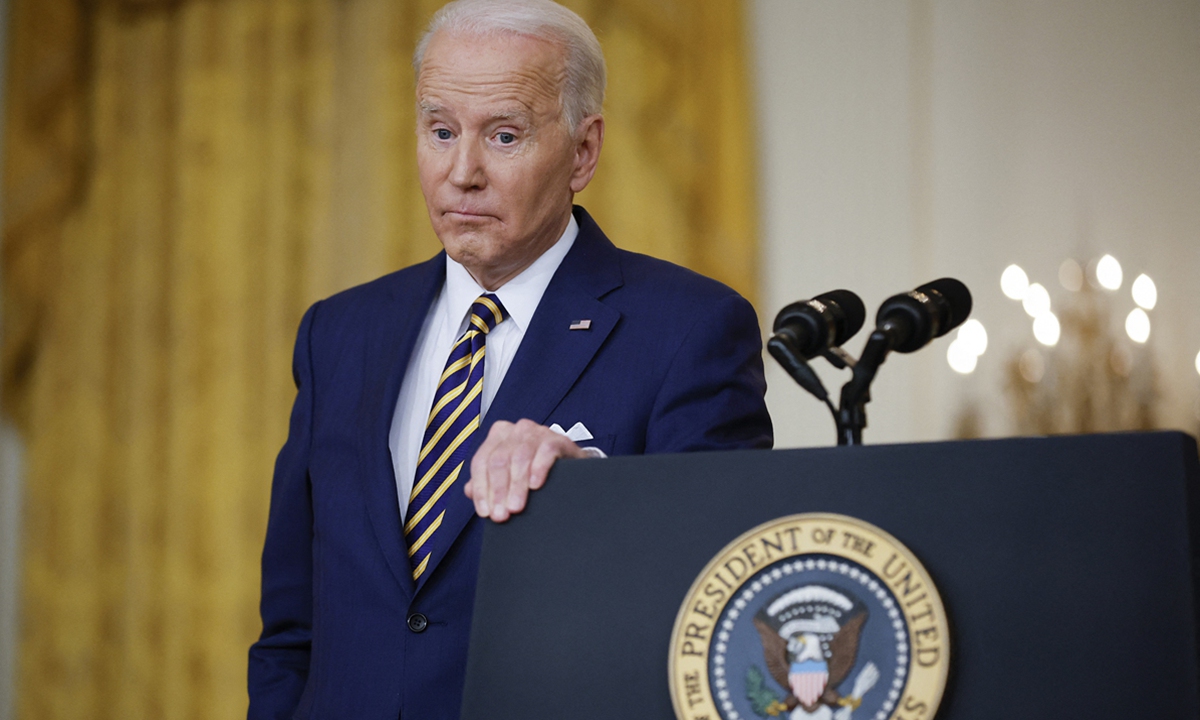Biden admin may ‘keep spigot open’ to aid Ukraine despite possible ‘lame duck’ in midterm election

US President Joe Biden Photo: AFP
Questions and suspicions on whether US would shift its approach to Ukraine have been raised, as more analysts noticed the recently disclosed phone call indicating US President Joe Biden and Ukrainian President Volodymyr Zelensky's discord over military assistance and some Republicans vowed to cut aid to Ukraine if they take control of Congress.
However, Chinese experts believe that US politicians are more likely concerned with wooing domestic voters with an "America First" gesture before the upcoming midterm elections. Given that it is politically correct to get tough with Russia in the US, it will be almost impossible to see a halt to the US' military aid to Ukraine any time soon, while Washington's European allies are likely to be asked to do more.
According to a Monday report from the pro-Democratic NBC News, Biden "lost his temper" with Zelensky in a June phone call as the Ukrainian President listed all the additional help he needed after Biden finished telling Zelensky he had just approved $1 billion in US military assistance.
Citing a source familiar with the matter, NBC said Biden lost his temper and told Zelensky that "American people were being quite generous" and Zelensky "could show a little more gratitude."
NBC commented that the clash reflects Biden's awareness that "both congressional and public support for sending billions of dollars to Ukraine could begin to fade."
In Congress, the bipartisan willingness to sustain financial and military support to Ukraine seems to be waning.
About 30 liberal Democrats, who are also House members, called on Biden to shift course in the Ukraine strategy and pursue direct diplomacy with Russia in a letter last week, CNN reported. The letter was retracted after it triggered uproar among Democrats.
Some Republicans have also signaled they would like to see an end to aid to Ukraine if they take control of Congress. House Minority Leader Kevin McCarthy, who could become House speaker if the Republicans retake the House in November, said that the GOP "is likely to oppose more aid to Ukraine," as Americans want Congress to "focus on issues closer to home," according to a Washington Post report on October 18.
Republican Senate nominee Blake Masters, according to Washington Post, also criticized the funding for Ukraine in May, saying it means "America last," and warned of the risk of an "all-out nuclear war between nuclear powers." Some nominees believe that funding a long-term conflict has "diminishing returns" for the US, and that "you can't save Ukraine by dooming the US economy."
Liu Weidong, a research fellow at the Institute of American Studies at the Chinese Academy of Social Sciences, told the Global Times on Tuesday that the slight change in rhetoric toward military aid for Ukraine by political forces in the US is a pragmatic approach designed to please voters, and both parties wants to signal their support for "America First" and domestic interests.
But it is not a reflection of the mainstream US attitude toward the Russia-Ukraine conflict, as confrontation and toughness against Russia is conventional political orthodoxy in the US, Li said. "Even if the Republicans take back control of the House and even the Senate, it is unlikely that the US will halt military aid to Ukraine, because that would mean bowing to Russia."
The US has authorized at least $60 billion aid to Ukraine, according to US media.
Echoing Liu, a Beijing-based international relations expert told the Global Times that even if the Biden administration becomes a "lame duck" after the midterms, US aid to Ukraine is unlikely to stop, with only the pace and volume likely to change.
While the Biden administration is constrained by Congress, it may press its EU or NATO allies for more aid for Ukraine, the expert said. "The US and its NATO allies will renegotiate in light of new changes in American internal politics… There is expected to be an uncomfortable spat between America and Europe over how much, and by whom the aid is offered."
Although a recent survey from Pew Research Center shows that the proportion of Americans who are very concerned about Ukraine losing the conflict with Russia has dropped by 17 percentage points to 38 percent from 55 percent since May, analysts said the possibility of reconciliation between Russia and Ukraine is extremely low, and the conflict will definitely last until next year or even longer.
In the transcript of an interview to CBC last week, released by the US Department of State, US Secretary of State Antony Blinken that Biden is not seeking to hold a meeting with Russian President Vladimir Putin on the sidelines of the G20 summit in Indonesia, media reported.
It can be expected that the US will keep its money spigot open and ignore the growing opposition at home, just for the sake of their "hegemony," the Beijing-based expert said.

